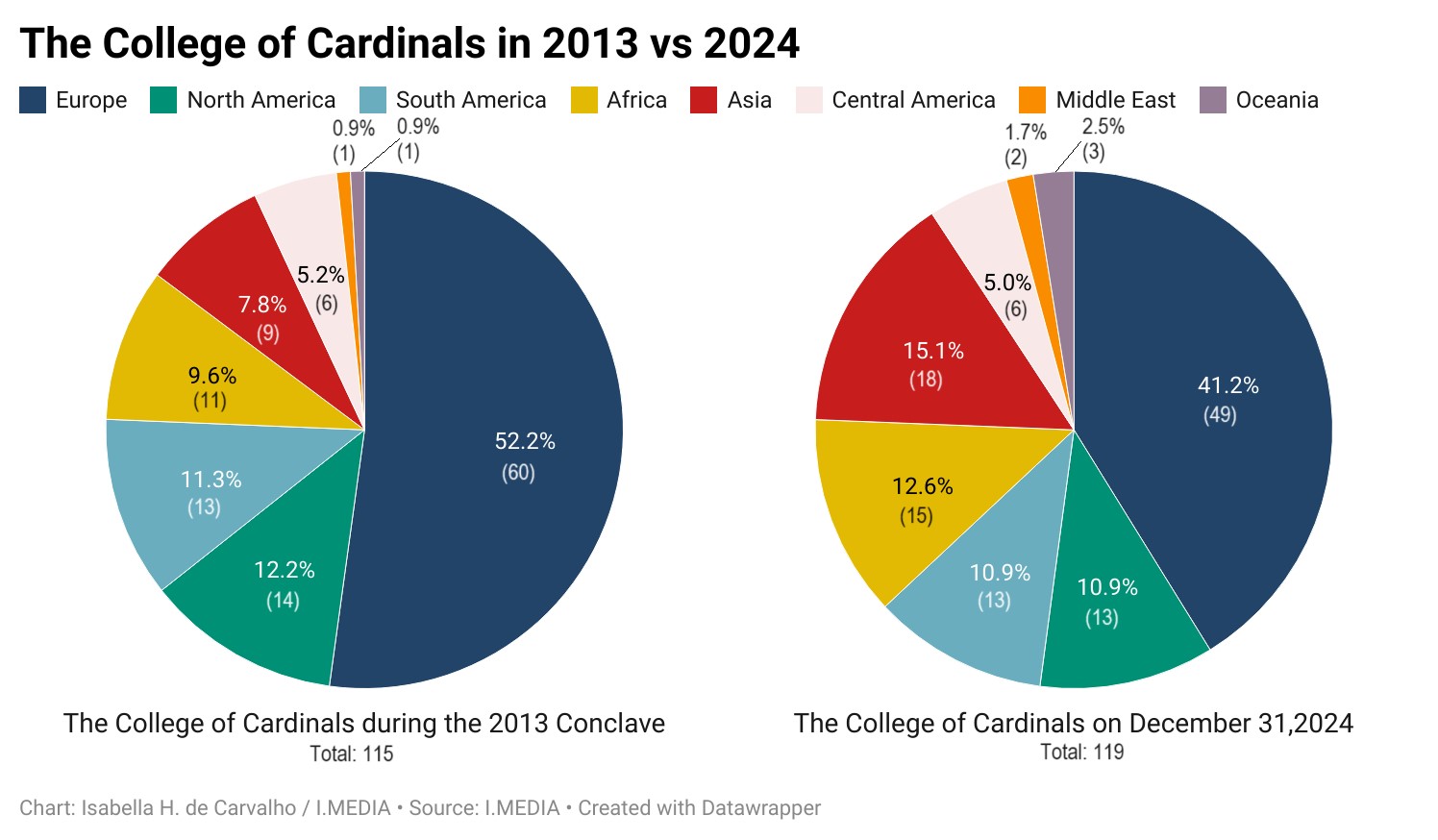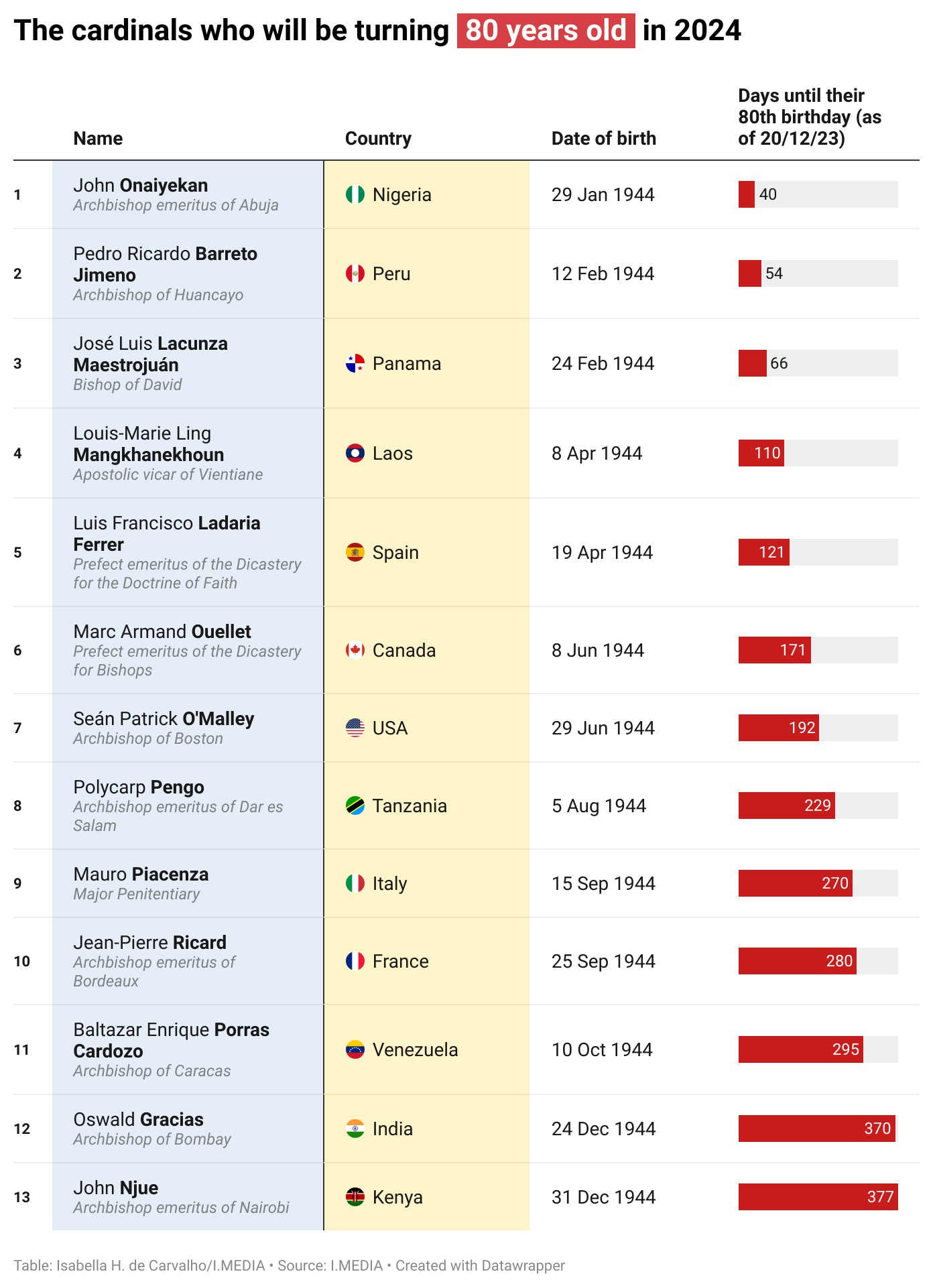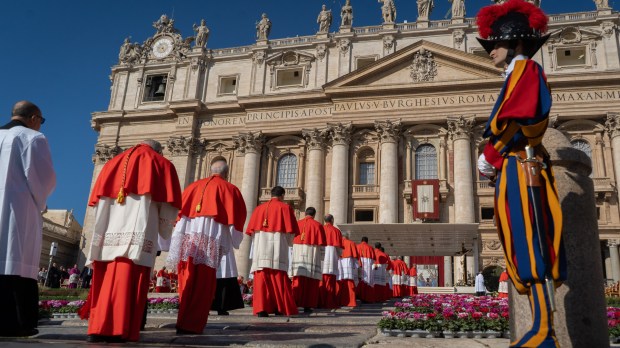In 2024, unless a member of the College of Cardinals dies or is excluded by the pope, the number of cardinals who lose their right to vote in a conclave will be 13. These cardinals will lose their right to take part in a conclave due to turning 80 years old. Since 1970, only cardinals under the age of 80 have been eligible to elect the pope.
Three Europeans, two Asians, three Africans, two North Americans, two South Americans, and one Central American, all born in 1944, will leave the College of Cardinal electors this year. On December 31, 2024, the birthday of Kenyan Cardinal John Njue, the number of cardinals eligible to elect a pope will be 119, if a consistory is not held during the year. This number is one less than the theoretical maximum, set by Paul VI in 1975, of 120 electors in the college.
Small changes since 2022, big changes since 2013
This natural evolution will not profoundly upset the geographical balance of the College of Cardinal electors, unlike in 2023, where there was a rapid “de-Italianization,” with five Italian cardinals turning 80 years old. In 2024, only one Italian will leave the electoral college, which will number 13 Italian cardinals by the end of the year. During the 2013 conclave, 28 Italians (24%) took part in the vote.
Looking ahead to December 31, 2024, it is evident that Pope Francis has substantially changed the composition of the college of cardinals since the conclave that elected him in 2013. The European cardinals, who were the majority in 2013, representing 52.2% of the college, now account for 41.2%.
The weight of the Asian and African representatives has instead increased.The College now has twice as many Asian cardinals as it did 10 years ago, a sign of Pope Francis’ desire to highlight the Church’s dynamism in this part of the world. AsI.MEDIA recently analyzed, the number of priests in Europe has fallen over the last decade (-14.7%). By contrast, Asia and Africa have seen a strong increase: +22.3% of Asian priests and +33.1% of African priests in the space of 10 years.

Who are the 13 cardinals leaving the College?
Among the “outgoing” members of the electoral college in this year are some important and influential figures in the Church. These include the former prefect of the Dicastery for Bishops, Marc Ouellet, and the former head of the Dicastery for the Doctrine of the Faith, Luis Francisco Ladaria Ferrer. American Cardinal Seán Patrick O’Malley, President of the Pontifical Commission for the Protection of Minors, will also be unable to vote after his birthday on June 29.

1
John Onaiyekan, Archbishop Emeritus of Abuja (Nigeria)
A respected theologian and peacemaker in Nigeria, Cardinal Onaiyekan is an important figure in the Catholic Church in Africa. Ordained a priest in 1969, he became his country’s youngest bishop in 1983, aged just 39. Created a cardinal in 2012 by Benedict XVI, he devotes his energies to promoting dialogue and peace in a country torn apart by deadly ethnic conflicts, kidnappings, and settling of scores. In 2012, he was awarded the international Pax Christi prize and nominated for the Nobel Peace Prize along with the Sultan of Sokoto, a prominent Nigerian Muslim. In 2019, Pope Francis accepted Cardinal Onaiyekan’s resignation as the head of the Archdiocese of Abuja due to having reached retirement age. He had been Archbishop of this area for 27 years.
2
Pedro Ricardo Barreto Jimeno, Archbishop of Huancayo (Peru)
A Jesuit cardinal, Pedro Ricardo Barreto Jimeno is one of the most fervent defenders of the Amazon, as well as of family values, within the College of Cardinals. John Paul II appointed him first Vicar Apostolic of Jaén in 2001, then Archbishop of Huancayo — in the central Peruvian mountains — in 2004. His fellow Jesuit, Pope Francis, created him a cardinal in 2018. Pedro Ricardo Barreto was one of the key figures at the 2019 Synod on the Amazon, of which he was delegate president. Highly committed to the environment and indigenous populations, he has led awareness-raising campaigns throughout the Americas.
3
José Luis Lacunza Maestrojuán, Bishop of David (Panama)
Born in Pamplona, Spain, José Luis Lacunza Maestrojuán joined the Order of Augustinian Recollects and was then sent to Panama. In 1985, John Paul II appointed him Auxiliary Bishop of Panama. He then obtained Panamanian nationality. He was appointed Bishop of Chitré and then of David in 1999 and he distinguished himself for his work in favor of indigenous populations, defending them against mining companies seeking to appropriate their land. In 2015, Pope Francis created him a cardinal, making him the first from the small Central American country. Four years later, Cardinal Maestrojuán welcomed the Argentine pontiff to Panama for World Youth Day, an event he had prepared with great fervor.
4
Louis-Marie Ling Mangkhanekhoun, Apostolic Administrator of the Vicariate of Vientiane (Laos)
Louis-Marie Ling Mangkhanekhoun, the first and only cardinal of Laos, is one of those representatives of a Church that still suffers. Baptized by a French missionary at the age of 8, this very poor child entered the seminary despite the hard sacrifice it represented for his family. He studied in Quebec, then returned to a refugee camp in his homeland to be ordained, just as the Communist regime came to power. He was arrested as a priest and then forbidden to celebrate the Eucharist in prison for three years. He still continued his mission in spite of everything and was appointed vicar apostolic of Paksé in 2000. He tried to establish a dialogue with the government that was very hostile to Christians. In 2017, the bishop was appointed Apostolic Administrator of the Vicariate Apostolic of Vientiane by Pope Francis, who also created him a cardinal.
5
Luis Francisco Ladaria Ferrer, Prefect Emeritus of the Dicastery for the Doctrine of the Faith (Spanish)
Luis Ladaria joined the Society of Jesus in 1966. A renowned and influential theologian at Rome’s Gregorian University, he was appointed by Benedict XVI in 2008 as Secretary of the Dicastery for the Doctrine of the Faith. Pope Francis chose him as prefect of this Dicastery in 2017 to replace Cardinal Müller.
6
Marc Ouellet, Prefect Emeritus of the Dicastery for Bishops (Canadian)
An influential prelate within the Roman Curia, “papabile” at the 2013 conclave, Cardinal Ouellet has emerged as a defender of a conservative line compatible with the pontificate of Francis, with whom he has worked since his election by being in charge of the process of appointing bishops. Prior to this, he was Archbishop of Quebec from 2003 to 2010. A close collaborator of Benedict XVI, who appointed him as head of the Dicastery for Bishops, Ouellet defended priestly celibacy and confronted the German bishops who were pushing for ‘advances’ on this issue or the ordination of women. On January 30, the Argentine pontiff accepted his resignation for having reached the retirement age.
7
Seán Patrick O’Malley, Archbishop of Boston (USA) and President of the Pontifical Commission for the Protection of Minors
Cardinal Seán O’Malley, Archbishop of Boston, is one of the most prominent figures in the fight against abuse in the Church. Born in Ohio, this Franciscan was appointed in 2003 to the head of the Diocese of Boston, where The Boston Globe’s ‘Spotlight’ team had published the results of its investigations into sexual abuse committed by priests on minors. The beginning of his episcopate was marked by a purge of the diocesan clergy. Ten years later, Pope Francis appointed him to the small council of cardinals responsible for implementing the reform of the Roman Curia. The Argentine pontiff also asked him to head the Pontifical Commission for the Protection of Minors set up at the Vatican. In this position, he issued guidelines for the world’s bishops and monitored various crises such as the abuse cover-ups in Chile.
8
Polycarp Pengo, Archbishop Emeritus of Dar es Salaam (Tanzania)
A leading figure in the Catholic Church in Africa, Polycarp Pengo was ordained bishop at 39 years old by John Paul II in person in 1983 for the Diocese of Nachingwea. In 1990, he was appointed Coadjutor Archbishop of the Diocese of Dar-es-Salaam, the country’s capital. In 1998, at the age of 53, he was created a cardinal by the Polish pontiff. In 2007, he became head of the Symposium of Episcopal Conferences of Africa and Madagascar (SECAM). Archbishop emeritus since 2019, the Tanzanian cardinal has long denounced the issues that affect Tanzania, including corruption and tribal and religious violence. An architect of Christian-Islamic dialogue in a country that is 60% Christian and 35% Muslim, he is concerned about the rise of Muslim fundamentalism, particularly from the Arabian Peninsula. He also deplores the Christian fundamentalism present in evangelical churches, which are attracting more and more people.
9
Mauro Piacenza, Major Penitentiary (Italy)
One of the most esteemed and influential “ministers” of the Holy See under Benedict XVI, Cardinal Piacenza in 2013 was transferred from the head of the Congregation for the Clergy to the Apostolic Penitentiary, a tribunal that deals with matters relating to the innermost being of people, their conscience, and their intimacy with God. Created a cardinal in 2010 by Benedict XVI, the Genoa-born Italian was thought to be a possible choice for Secretary of State.
10
Jean-Pierre Ricard, Archbishop Emeritus of Bordeaux (France)
Since 2019, Cardinal Ricard has been caught up in his abuse scandal that he himself revealed to the general public in November 2022. “Thirty-five years ago, when I was a parish priest, I behaved reprehensibly with a 14-year-old girl,” he confessed in writing. These revelations, which shook the French episcopate and the Roman Curia, cast a shadow over the career of this bishop who was twice elected to head the French Bishops’ Conference, from 2001 to 2007. A bishop since 1993, he was appointed Archbishop of Bordeaux in 2001 and was created a Cardinal in 2006 by Pope Benedict XVI. Last September, following a canonical investigation by Rome, the Frenchman was suspended from almost all public ministry for a renewable period of five years. The Holy See has not yet specified whether the Archbishop Emeritus of Bordeaux will remain a cardinal elector until his 80th birthday.
11
Baltazar Porras Cardozo, Archbishop of Caracas (Venezuela)
Appointed auxiliary bishop of Mérida in 1983 by John Paul II, Baltazar Porras Cardozo was entrusted with organizing the Polish pontiff’s visit to Venezuela in 1985 – he then also organized John Paul II’s second visit in 1996. An important political figure in this country marked by inequality, he did not hesitate to oppose Hugo Chavez and then President Nicolas Maduro, whom he openly criticized starting in 2013 when a serious economic and political crisis hit his country. In 2016, Pope Francis, to whom he is very close, created him a cardinal. In 2018, he appointed him Apostolic Administrator of the Archdiocese of Caracas, making him de facto the country’s most important prelate. Despite being 78 years old at the time, Pope Francis appointed him Archbishop of Caracas in January 2023.
12
Oswald Gracias, Archbishop of Bombay (India)
Cardinal Oswald Gracias is a leading figure in the Catholic Church in Asia. This important canonist was appointed Auxiliary Bishop of Bombay in 1997 and then, in 2006, Benedict XVI appointed him Archbishop of this city of over 18 million inhabitants. Created a cardinal the following year, Oswald Gracias was invited by Pope Francis to join his select council of cardinals in 2013, tasked with helping him reform the Roman Curia. A loyal follower of the Argentine pope, he is part of the more “pastoral” fringe of the cardinals, supporting decentralization and de-cericalization of the Church, and opening the priesthood to married men in certain regions (viri probati).
13
John Njue, Archbishop Emeritus of Nairobi (Kenya)
Cardinal John Njue is an important figure in the Catholic Church in Africa. Appointed bishop at the age of 42, he became archbishop of Kenya’s capital, Nairobi, in 2007, and was subsequently created a cardinal by Benedict XVI. He was also president of the Kenyan Bishops’ Conference from 2006 to 2015. As a pastor, he wanted to accompany the transition of the Church in Kenya – evangelized by European missionaries – so that African Catholics felt more autonomous and responsible for their Church. In 2015, he faced the terrible attack on the Garissa University College by Islamic fundamentalists Al-Shabaab. The attack left almost 150 Christian students dead. After visiting the morgue to pray for the dead, the Cardinal confided that he had also prayed for the killers. That same year, the cardinal welcomed Pope Francis to his country.

